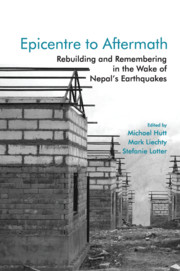3 - Expertise, Labour, and Mobility in Nepal's Post-Conflict, Post-Disaster Reconstruction: Law, Construction, and Finance as Domains of Social Transformation
Published online by Cambridge University Press: 08 July 2021
Summary
Introduction
How have people affected by Nepal's 2015 earthquakes experienced the reconstruction process on the ground? This chapter draws on ethnographic data collected during Nepal's post-earthquake reconstruction to inform theoretical questions about relationships between expertise, labour, and mobility in shaping post-disaster outcomes, including broader societal transformations. Based on a collaborative research project conducted between 2017 and 2020 in three of Nepal's earthquake-affected districts (Bhaktapur, Dhading, and Sindhupalchok), we point to legal, material, and financial processes that constitute lived experiences of reconstruction at the household level.
Since its inception in 2017, our project has explored the domains of law, construction, and finance to ask: How successful has Nepal's ‘owner-driven’ reconstruction model for households been at ensuring positive outcomes, on material, sociocultural, and subjective levels? How have domestic (that is, Nepali national) professionals, such as engineers, lawyers, and non-governmental organization (NGO) staff, served as mediators between earthquake-affected community members and institutional actors implementing reconstruction at the scale of local governance? How have relations of power and their material outcomes been negotiated? How have worldviews and practices been reshaped along the way? And how have fluctuating labour markets and conditions of high mobility shaped these interactions?
Such questions are important both for evaluating the often contradictory outcomes of reconstruction's multiple interventions and for examining the wider sociopolitical context of disaster and relief projects, such as Nepal's post-conflict process of state restructuring that devolved power to local governments in 2017. In this context, we suggest that political and material transformations—at local, regional, and national levels—must be understood as intersecting with each other, rather than as separate trajectories.
As detailed in the introduction to this volume (Liechty and Hutt), Nepal's earthquakes struck at a period of protracted political impasse which politicized and delayed the establishment of a central state agency to coordinate relief efforts by nearly seven months. The National Reconstruction Authority (NRA) only unveiled its first ‘four-phase plan’ in January 2016, and it took another three months for the first housing grants to be released, not least because an entire infrastructure of relief coordination needed to be erected (The Kathmandu Post 2015b, 2016c)
- Type
- Chapter
- Information
- Epicentre to AftermathRebuilding and Remembering in the Wake of Nepal's Earthquakes, pp. 49 - 86Publisher: Cambridge University PressPrint publication year: 2021
- 1
- Cited by



